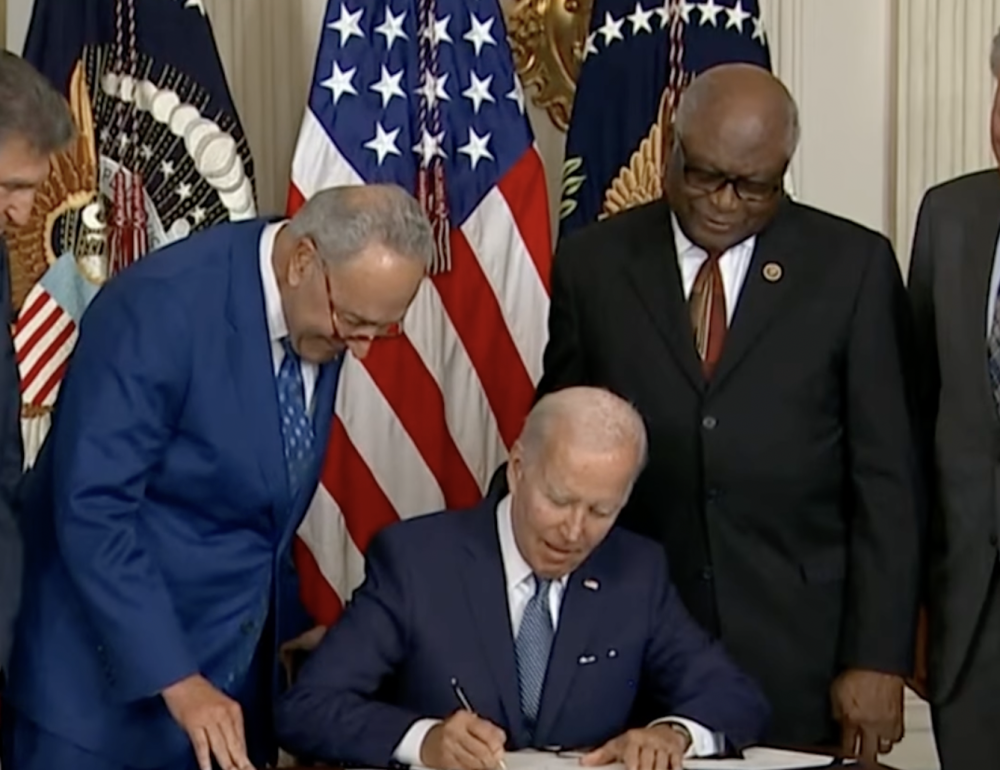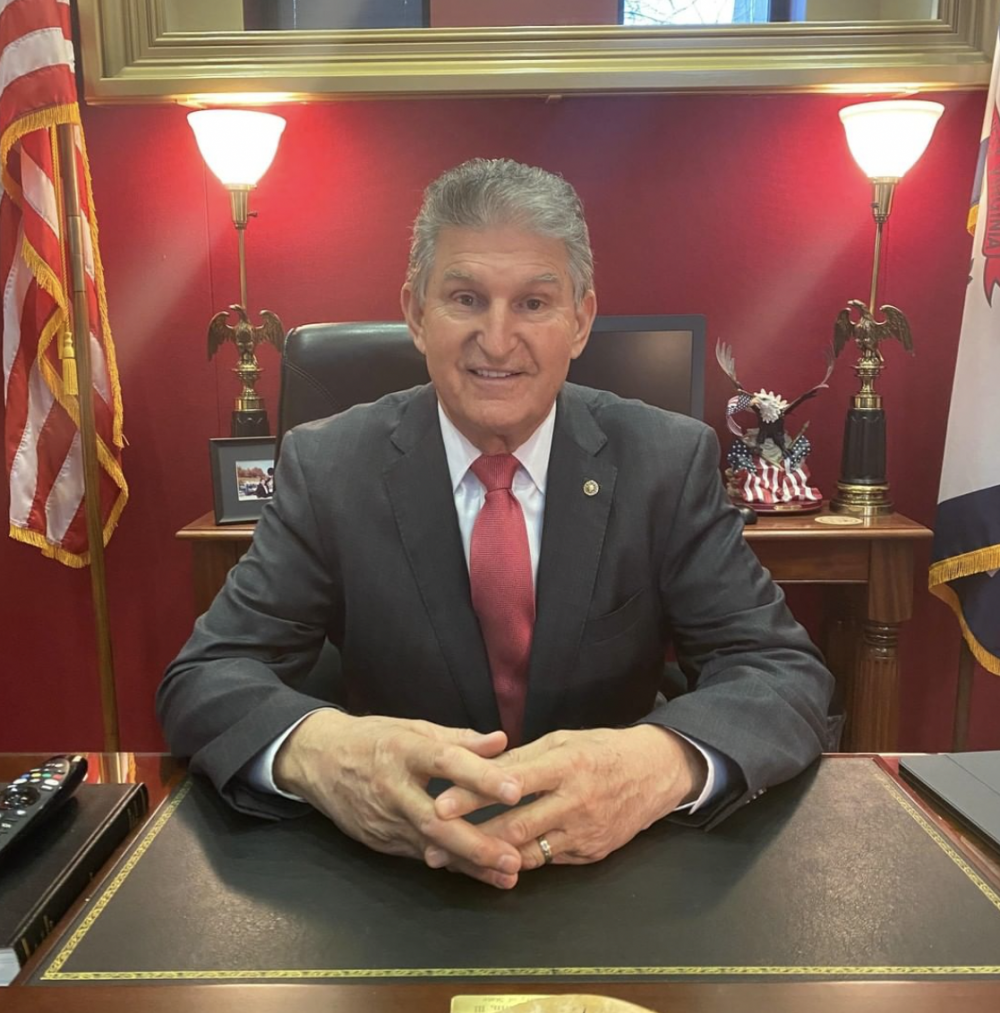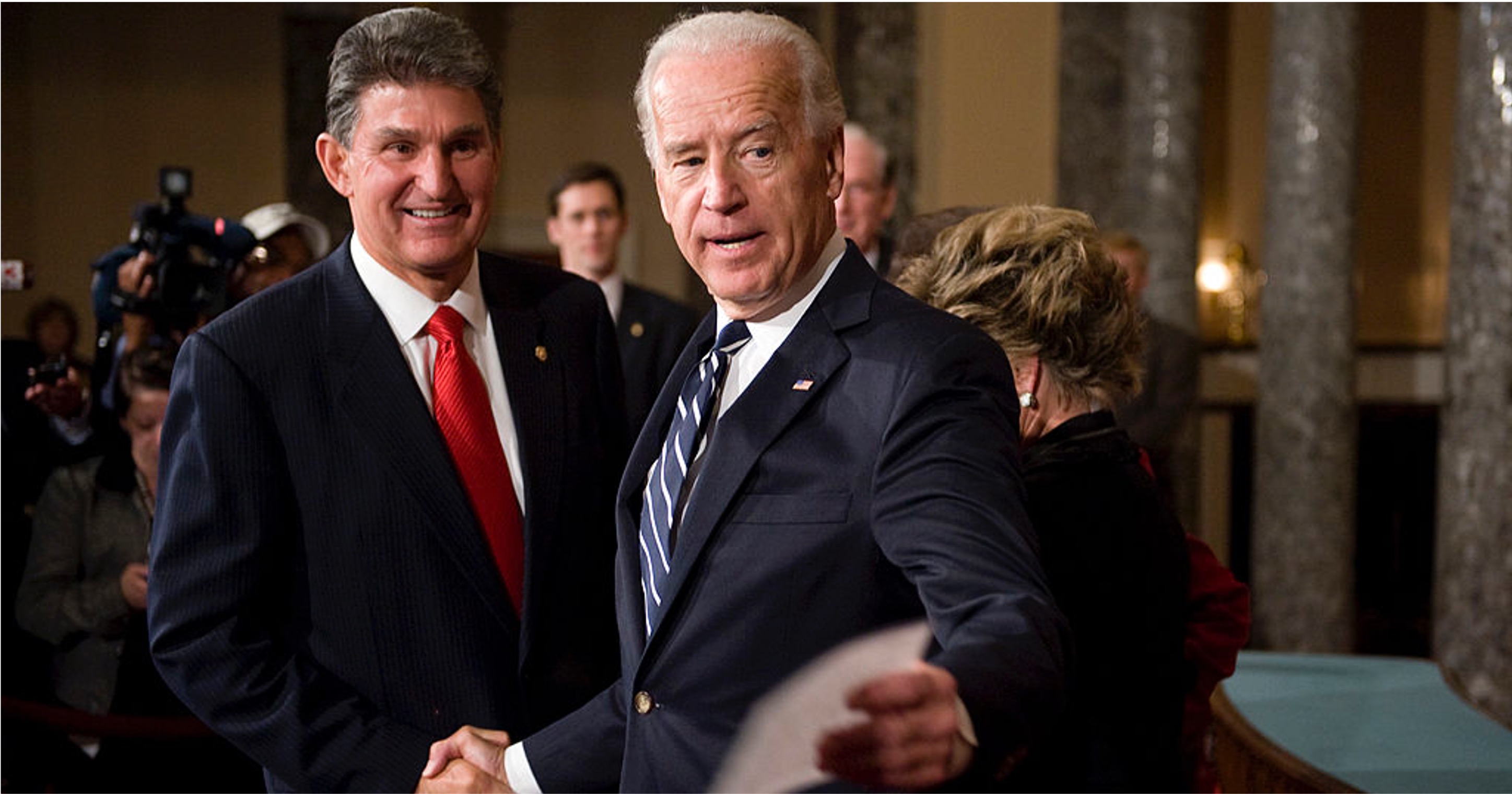Follow us on Telegram for the latest updates: https://t.me/mothershipsg
With a stroke of his pen on Aug. 16, U.S. president Joe Biden signed the Inflation Reduction Act into law.
"This is one of the most significant laws in our history," Biden said during the official signing ceremony.
 Screenshot from Joe Biden's Facebook page.
Screenshot from Joe Biden's Facebook page.
According to CNN, Biden said, "With this law, the American people won and the special interests lost. For a while people doubted whether any of that was going to happen, but we are in a season of substance."
Biden was right about the doubts. The journey to get to this point had seemed all but unthinkable just a few weeks ago, because Biden had seemingly failed to get the necessary support in the Senate.
Balance of power
The U.S. Senate is the upper chamber of Congress. There are 100 senators in total, two from each U.S. state, and a simple majority is needed to pass legislation.
If there is a tie, the vice president may cast a tie-breaking vote. This therefore gives an advantage to the party who holds the White House.
Currently, the Senate sits on a knife's edge, with 50 Democrats and 50 Republicans, following the 2020 elections.
The Democrats can therefore use Vice President Kamala Harris's tie-breaking vote to pass legislation, but with a catch.
If just one Democratic senator breaks ranks and refuses to vote the same way as their colleagues, then the president cannot pass legislation.
Enter Joe Manchin.
 Screenshot from Joe Manchin's Instagram page.
Screenshot from Joe Manchin's Instagram page.
The other Joe
Manchin is an anomaly in current U.S. politics. He represents West Virginia in the Senate, which is a heavily Republican state. In 2020, it went for Donald Trump over Biden by almost 40 points.
2020 also saw a Senate election in West Virginia, where the Republican Shelley Capito beat the Democratic Paula Swearengin by over 40 points.
But the state's other senator, Joe Manchin, is a Democrat. Manchin is a former governor of West Virginia and became its senator in 2010. And despite the state trending heavily Republican, he remains a senator today.
Due to the 50-50 balance in the Senate, Manchin wields tremendous power because he can kill any bill by withdrawing his support.
He has worked with Biden on some pieces of legislation, like the American Rescue Plan that poured money into financial support after the Covid-19 pandemic.
But he also killed Biden's ambitious Build Back Better bill, a US$2 trillion piece of legislation investing in childcare, healthcare, and action against climate change.
Kill bill
In an interview with Fox News on Dec. 19, 2021, Manchin confirmed that he would be voting no on the bill. The backlash was swift and intense.
Manchin was condemned by his colleagues, including Vermont's Bernie Sanders, who said, "Look; we were dealing with Mr Manchin for month after month after month. But if he doesn't have the courage to do the right thing for the working families of West Virginia and America, let him vote no in front of the whole world."
But while the supporters of the bill despaired, one man didn't give up hope. That was Senate Majority Leader Chuck Schumer of New York.
Schumer kept in touch with Manchin throughout the spring and summer of 2022, negotiating non-stop with the wayward West Virginian.
He gave in to some of Manchin's demands, including finishing the construction of a natural gas pipeline in his state, and to reduce the size of the bill down to about US$737 billion. Meanwhile, Schumer also got the support of another wavering senator, Krysten Sinema of Arizona, by agreeing to her demand not to close a tax loophole.
Biden, aware that his approval ratings were underwater, took a hands-off approach that may have paid dividends.
Near the end of July 2022, Schumer and Manchin shocked political observers by announcing they had reached an agreement.
The new bill and legislation was named the Inflation Reduction Act. The New York Intelligencer commented:
"Schumer was now filled with optimism that his legislative achievements would yield wins for Democrats in the midterms...
He was convinced, too, that Biden’s numbers would improve, even after the gridlocked Senate had done so much to bring them down. 'I think he’s done a very good job,” said Schumer. “But I think, you know, there are things that people are very, very cranky about: inflation. Covid. And he’s not to blame for those, but he’s the leader.'"
Inflation, inflation, inflation
Since the world at large reopened for business and activity after the Covid-19 pandemic, global inflation is on the rise.
The causes are many. Supply chain foul-ups, increased demand after two years of low spending, China's zero Covid strategy interrupting manufacturing, and the Russian invasion of Ukraine have all combined to drive up the prices of goods and services everywhere in the world.
And in the U.S., inflation will be a major factor in determining the U.S. midterm elections.
Speaking to Mothership in a press briefing, Gallup editor-in-chief Mohamed Younis said that inflation, and prices at the pump in particular, will play a significant role:
"I think we live in the world of public opinion, and Americans certainly expect this to keep going on. Americans are not expecting inflation to get under control anytime soon. Gas prices here are astronomically high. They’re higher – just speaking on a personal level, higher than I can ever remember them being, and the expectation is that they’re going to continue to rise.
Those are really, really critical for Americans for two reasons. Number one, the price of energy at the gas pump is not subsidised in the United States at all, and it is in many other countries across the world.
And number two, America is a driving nation, is a very spread-out country. Very few Americans ride the metro or use public transportation. So the price of gas is really, really critical. Even though it’s – summer is coming in and it’s not necessarily a heating concern, it’s going to be a major focus of Americans at this – at night when they sit down at the dinner table with their families."
This was in March 2022, barely a month after the Russian invasion of Ukraine. At the time, gas prices hit a record high of US$4.33 (S$6.21) to a gallon.
However, after a few months and action taken by the Biden Administration, including tapping into the Strategic Petroleum Reserve, oil prices came down, and gas prices followed suit.
Will the Inflation Reduction Act reduce inflation?
The fact that that Inflation Reduction Act is so named may point to the White House's acknowledgement of the topmost issue on American minds.
However, the Act looks a lot like the previous Build Back Better bill, with its investments in green energy and healthcare. So how is it supposed to actually reduce inflation?
According to the White House, the Act tackles inflation by lowering energy and healthcare costs, and also reducing the deficit.
However, experts NPR spoke to said that it won't curb inflation straight away, and renewable energy investments will take time to come to fruition before it can help to bring down energy prices.
According to the non-partisan Congressional Budget Office, the Act is expected to have a "negligible" impact on inflation in 2022.
So, while Biden's signature legislation of 2022 may be named as such, it may not help in bringing down inflation rates, which in turn may wreck his party's chances in the upcoming midterm elections.
Reuters reported that the Consumer Price Index has remained above 8 per cent for six straight months, as of August 2022.
In a press briefing, Doug Schwartz, director of the Quinnipiac University Poll highlighted that inflation can act as an anchor around Biden's ankles going into the midterms:
"Five weeks until Election Day a lot can happen and the question is: Will this midterm election follow historical patterns or set a new precedent? Republicans have history on their side when the party out of power has the advantage of usually picking up congressional seats in the midterms.
There is also president Biden’s approval rating, which has improved but is still negative, where more voters disapprove than approve. And inflation continues to be a big concern for voters, and that doesn’t help an incumbent president and his party."
Mothership is taking a look at the U.S. midterm elections. Check out the other stories in our series:
Top image from Getty Images.
If you like what you read, follow us on Facebook, Instagram, Twitter and Telegram to get the latest updates.
